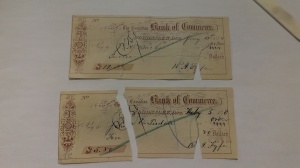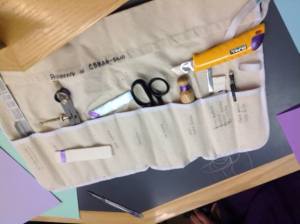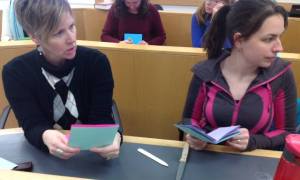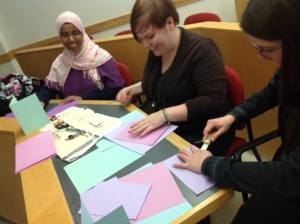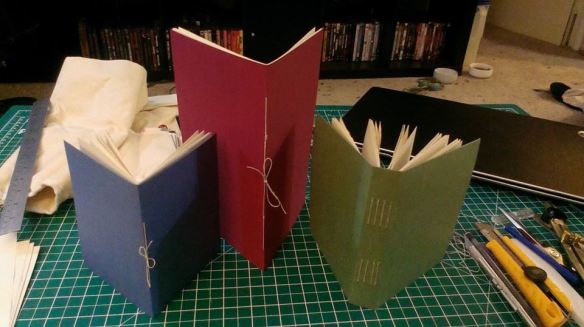So, due to end-of-term craziness, home for a visit, being keeping busy with job hunting, conferences, and volunteer work, I have not been as diligent with my blog as I had hoped. I hope to be more consistent with it from now on as I have a bit more free time on my hands. The past two months have been full of many accomplishments and professional developments which I should have been posting about regularly but instead I will just write a brief summary in this post here to get myself going again (I have a list of ideas for future posts, so I want to get back on track).
Well, first things first……I have completed my MLIS degree since my last blog post! It has been the most amazing and transformative experience of my life. I have learned so much about myself in the past year and a half and feel like I have finally found my “home” within the profession. School was more than just classes and assignments (which was of course a huge chunk of it) but more so about the extracurricular activities and events I have been a part of. A large part of my experience goes beyond the classroom as I attended conferences, joined student groups and professional associations, taught workshops, gained work experience, completed volunteer practicums, and spoke at my first conference. I have met some of the most amazing people who share common interests with me from around the country and beyond. I feel honoured to country these people among my colleagues and can’t wait to be working with you all. To me this has been the most valuable part of this experience and the reason I chose to do a full-time, in-class degree instead of doing it part-time or by distance. While it is nice to not have homework for a change, I really do miss being in the classroom and lament that it was over so quickly (enjoy every moment of it, even when you feel you hate it). While I look forward to the next adventure life has in store for me, whatever that may be, I will look back fondly on my time at FIMS and am glad I made the decision to come here (no regrets).
Perhaps the most surprising event recently was that I had the honour of winning the “Spirit of Librarianship” award at the end of my semester as voted on by my peers and professors, which recognizes contributions made to the library school community, such as my dedication for helping fellow students, steadfast presence in school life, and a positive and friendly attitude. I felt like the people at FIMS and my time there had made such a positive impact on my life, it was great to know that I at least made a little bit of a positive contribution myself. I always want to leave a place better than I found it and I was happy to hear from friends that people were still talking about the bookbinding workshops I taught last term in their Information Literacy course this term. Also the fact that more people are talking about bookbinding in general just makes me happy! 😀
I also finished my contract working as a Library Assistant working at the Graduate Resource Centre (GRC) at FIMS. I am very grateful to FIMS Librarian Marni Harrington for giving me the opportunity to experience working in an academic library setting, contribute to the FIMS community, and who encouraged me to run the bookbinding workshops. Knowing my love for rare books and special collections, Marni had me create a digital exhibit of the GRC’s special collections materials using Omeka and I was able to mostly finish the site before I left (the perfectionist in me would have liked to tidy up the descriptions a bit more). The site can be found here: http://fimsgrc.omeka.net/ and while only the Rare Books collection is up, there are plans for additional collections to be added as well this term.
I also had the pleasure of speaking at the Humans of New Librarianship conference, organised by the CLA and SLA student group chapters who did an amazing job at planning everything. Guest speakers for the conference included the hilarious and brilliant Stephen Abram and FIMS own MLIS professor Sarah Roberts who spoke about her PhD research (and who recently successfully defended her dissertation, so kudos to Prof. Roberts)!!! There was a lunch over at the Grad Club, a “bakerspace” available at coffee breaks (aka build your own delicious baked goods), and the day concluded with lightning rounds from MLIS including myself. I spoke about a Human-centered approach to archives and special collections, specifically in academic libraries but I am going to go into more detail on that in another post!
Last week I volunteered at the Festival of Trees here in London at the Western Fair District (a ceremony part of OLA’s Forest of Reading program to honour Canadian authors and promote literacy). The Festival is Canada’s largest literary event for young readers and had events across Ontario in Thunder Bay, London, Ottawa, and Toronto. It was a blast to be at and I enjoyed running various activity stations for the students and talking to them about books and reading and school. The London event had about 1500 students (as well as teachers and parents) and I was very happy to see them get so excited about reading!! Who says kids don’t read anymore today?? In fact I would bet they read even more than ever due to the access of material online and through e-books. Also the fact that not all kids read books doesn’t mean they aren’t reading. Still, great to see young readers being encouraged!
Finally, I have been busy attending conferences and volunteered at the OLA Super Conference back in February (my first conference ever)! I attended some good lectures on makerspaces and special collections libraries in academic universities and volunteered at the career centre! I regretfully had to miss the Code4Lib conference held at the London Public Library at the beginning of May but am eagerly anticipating the WILU conference happening this week from May 21-23 at UWO to which I am attending (and will hopefully blog about). If I am still in London at the end of June/beginning of July I am hoping to take another bookbinding course with Dan Mezza with CBBAG. The course being offered is the Finishing course (more advanced decorative techniques) in which I will learn more about blind and gold tooling techniques, inlays and onlays, and tilting on the spine. I am hoping I’m able to take this course and pics and comments will follow!
Alright I hope I wrote enough to make up for my absence the past while. I look forward to posting again soon!!
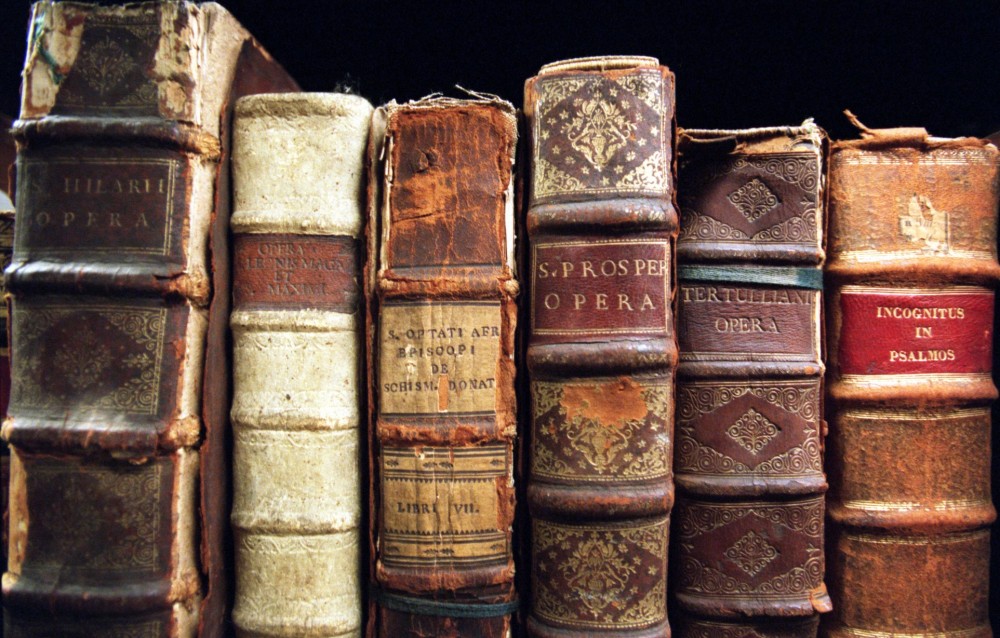
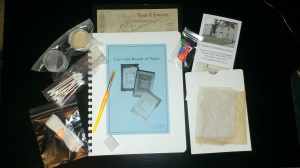
 d
d